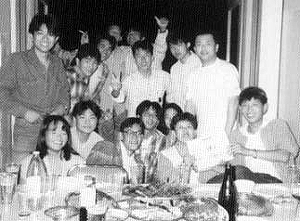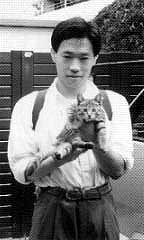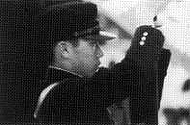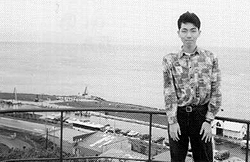Hironori Hayashi (21)
 Faculty:Economics,2
Faculty:Economics,2Alma Mater: Yamaguchi Prefectural Shimonoseki-nishi High School
Stricken area: Room 104, the Yasuda-bunka Apartments, 1 Syogun-dori Nada Ward, Kobe
Keiko Hayashi (Mother, living in Yamaguchi Prefecture)
Hironori was born the eldest brother of two younger sisters. He was delicate in health in his childhood. But he whole-heartedly participated in all he did. Playing an active part as a class leader and a captain of his tennis club. Entering university, studying and working part-time he enjoyed his new life of living alone.
It was two days before the earthquake that I received a telephone call from him. He said his neighborhood was on fire and I responded "Be careful!". I little dreamed that the telephone call should be the last occasion I could hear his voice. I got the news of the earthquake on TV, I tried to ring him up in Kobe but couldn't reach him. I made up my mind to go there because his friend had told me he was missing. It was difficult to make my way to Kobe via Himeji. I reached the Nada Ward office under the guidance of police.
I saw his dead body with his friends. He was crushed to death because his room was on the first floor. One thing which could set me at ease was that he had died without so much pain. I couldn't stand to see remains carried out one after another. I had to stay in Kobe because his dead body needed the inspection of police and doctors. Even now I often recall the scenes in Kobe at that time : the statement of neither food nor water, patrol cars and ambulances through the night, and leaning skyscrapers.
Good luck to all the people who helped me and to the students of Kobe University. Though he ended his life at 21, I will live my life in the presence of him.
Akira Kanayama (Husband, living in Ashiya City)
Shoichiro Uemiya (professor, her seminar teacher)
Tomoko Shiraki (Mother, living in Kawanishi City)
Akiko Kanayama(44)
Faculty:Economics (night courses),5
Major:History of Economic Thought, Uemiya Seminar
Stricken area: an alley in Maeda-cho, Ashiya City
She went out to take a walk with her dog, Happy when the earthquake occured. It destroyed houses and stone walls in my neighborhood. I asked volunteers to immediately dig up where she should be. But I was rejected because they were to give priority to save not the missing, but the living. At last it was a week after that her dead body was found under the fallen houses in a narrow alley.
She was the mother of a daughter, who was in a high school, and a son, junior high. She always said ''I don't want to be an ordinary housewife. I want to do what I want to do.''
Her theme of her graduation thesis was about a foreign tour our seminar was on every Wednesday from 5:30 p.m. to 8:40 p.m.. She was cheerful and energetic and played a role like a sister of students who were all in their twenties. As she was nearly the same age as me. She occasionally came to me for personal advice. We usually talked about education, because she was devoted to it for her children. I heard she said after graduating from this university she would try another field.
Kensuke Shiraki (21)
 Faculty:Economics (night courses),3
Faculty:Economics (night courses),3
Alma Mater: Hyogo prefectural Kobe High School
Club: Tennis club
Stricken area: Gunge Okura 16, Higashi-nada Ward, Kobe
My son Kensuke met a violent death at the youth of 21 years old on the day of the big earthquake, sleeping in his room bed.
His neighbor's warehouse fell down on his room, and he was crushed to death. Because of the unexpected situation, I had a shock as if the blood of my whole body had gone backward. Because this happening occured when he planed his life and made efforts to realize it, I doubt the exsistence of god.
He majored in economics, but also have the qualification of a government employee, and worked in the post office. On that income, taking a trip to Hokuriku district was his greatest pleasure after all. He seemed to be attracted especially with Kanazawa. Souvenir of Kaga-Yuzen, which is printed silk and used in Kimono, is left at my hand filled with sadness. There is a episode that when he visited Kanazawa post office because of his job, he met a very beautiful lady. Because she was so beautiful, he insured himself and came back. He had just obtained travel service manager's qualification because he liked traveling.
He belonged to a tennis club of his university. But he used to feel sad of not having much time to play tennis because he had too many things he wanted to do.
He believed that morning tea is a sign of good luck. He had already explained why it is such, and he always took Japanese tea during breakfast. I had promised him to wake him up at 6 a.m. on that day of the great earthquake. If the earthquake had happened a little later, he might have been able to take morning tea and escape death.
Go to Top page
 Faculty:Economics,3
Faculty:Economics,3 Faculty:Economics,2
Faculty:Economics,2